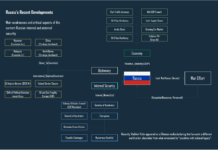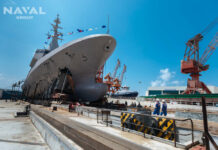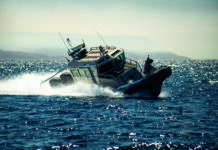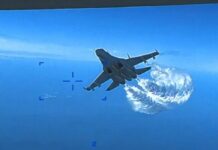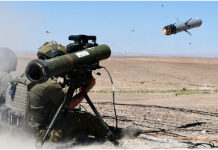There is no doubt that the ongoing Russian military action against Ukraine profoundly affects the rest of the Black Sea littoral states:
- Bulgaria
- Georgia
- Romania
- Turkey
Threats to Black Sea Security
The tense standoff of recent weeks placed each of them in a difficult position between apprehension and, particularly with Turkey, a kind of peacemaker or rather mediator, which Russia now ignores completely.
Romanian Defence Minister, Vasile Dincu, said in January 2022 that “Russia, at the moment, is not a direct threat to Romania, but it is [rather] a threat to security in the [Black Sea] area”. The author disagrees with the minister’s statement since the Russian military, which is stationed on the occupied Crimean peninsula – not much more than 100 km from the Danube Delta – is a direct threat to Romania, even though Russian officials will blame the other side for posing a threat to Russia. Furthermore, the region’s three NATO member countries, namely Bulgaria, Romania and Turkey, have until today been unable to create and implement a comprehensive Black Sea security strategy together with NATO aspirants Georgia and Ukraine to counter the challenges posed by Russia. The latter, however, successfully implemented its divide and rule policy in the region.
Bulgaria
Despite pressure on Bulgaria to ratify a treaty signed with neighbouring Romania on 18 March 2021 that would allow NATO cross-border air policing operations, the Bulgarian interim and new governments have hitherto not done so. While Romania has traditionally championed or supported initiatives to boost NATO multinational military efforts in the Black Sea region, Bulgaria has been more reluctant. This is due, among other factors, to its historical affinity with Russia and Russian economic interests in Bulgaria. It needs to be remembered that 70 per cent of Bulgaria’s gas needs and 90 per cent of its oil needs are imports from Russia. In addition, Russia supplies fuel to Bulgaria’s Kozloduy Nuclear Power Plant. As a result, it puts Bulgaria under pressure since the latter managed to diversify its gas imports only slightly and failed to diversify its oil imports altogether.
Former Romanian defence official and international security expert, Claudiu Degeratu, also mentions the “reluctance of Bulgaria and Turkey to share information about their airspaces with other governments in the region.” Besides, Turkey has been and still is reluctant regarding a Western military presence in the Black Sea and it shares close but complicated ties with Russia. All that despite the three countries being NATO members. So much for the common position that ends in tatters.
Once ratified, the aforementioned treaty will allow NATO air forces stationed in the Mihail Kogalniceanu Air Base to conduct policing operations in both countries. Situated near the Black Sea, the air base is the main hub for NATO aircraft in south-eastern Europe.
The country’s new Defence Minister, Stefan Yanev, caused a negative reaction in December 2021 after dismissing the need for more NATO troops in Bulgaria in the context of increased tension between NATO and Russia over Ukraine. Yanev said “the increased tensions call for a unified approach by NATO, but this might lead to unnecessary escalating tensions [with Russia]. At this stage, there is no reason to consider the observed processes as a direct threat to the [NATO] alliance and the security zone. In this sense, I do not believe there are the necessary circumstances that can justify a decision related to the deployment of additional troops on our territory. Such a decision would correspond neither to the union interests nor to the national interests of Bulgaria.”
Prime Minister Kiril Petkov announced in January 2022, “the country was ready to accept troops from NATO partner countries but within a joint battalion battle group with Bulgarian troops. This is part of the official Bulgarian position on the crisis in Ukraine which the government adopted” after the debate between the government coalition partners. One important point which needs to be stressed is that Bulgarian armed forces lack 21st century equipment to defend the country and they need to increase their combat training and readiness.
Georgia
The country’s political leadership is trying to maintain a good rapport with NATO. However, at the same time, it is doing its utmost not to irritate President Putin’s administration. This balancing act shows the indecisiveness and inability to reach the right decision. There is a lack of understanding within the Georgian Dream-led coalition government, namely that if Moscow achieves its goals in Ukraine, the next target will be Georgia where the Kremlin has some unfinished business to complete after the end of the August 2008 war.
Despite improvements to its land forces, Georgia lacks well-trained reserve, air, and naval forces to complement the land forces and the National Guard in a war situation. The country’s Coast Guard is not equipped for a military conflict or war since that is not its mission, but there are no mechanisms for ensuring coastal protection that can be easily overrun or blockaded by Russia. As a result, Georgia remains vulnerable to a Russian naval attack. Whether or not a well-equipped and trained naval force is possible is not yet clear.
Such a programme would be expensive for a small country like Georgia, and for now, it is uncertain whether the UK or the US would provide financial support. In addition, it lacks a sufficient number of air defence systems that can withstand attack from the Russian air force. Finally, Georgia remains vulnerable to Russian cyber-attacks, even though it has experienced Russian cyber-attacks in the past.
In other words, Georgia is not militarily prepared for a potential Russian offensive and the Kremlin knows that it can bully Georgia and continue the unobstructed ‘borderisation’ process along the administrative boundary line (ABL) between Georgia proper and the [Russian] occupied region of South Ossetia.
Romania
The Romanian National Defence Strategy for 2020-2024, signed by President Klaus Iohannis in June 2020 and approved by the Parliament the same month, defined Moscow as an “aggressive” threat. The proposed Defence Strategy stated that Russia had contributed to “the deterioration of regional stability with its “offensive positions and aggression in the last years.” It added that Moscow had strengthened its “offensive military capabilities in the Black Sea” and had created a system capable of “restricting access” to the Black Sea in order to “counterbalance” the development of NATO capabilities on the Alliance’s eastern border. As expected, the Kremlin flatly rejected these accusations, and claimed that the new strategy presented by Romania would be used to intensify the military presence of the US and NATO in the Black Sea.
Furthermore, Foreign Ministry Spokesperson, Maria Zakharova, stated, “Bucharest, instead of acting as a provider of stability, contributes to further increasing tensions and distrust in the region.” Foreign Minister Bogdan Aurescu explained that “Romania does not believe that Russia is a hostile state, rather that it is simply drawing attention to the aggressive actions it has undertaken in recent years, some of which have violated international law.” Aurescu’s assertion is dismissed by Moscow.
Following the approval of the Defence Strategy by the Parliament, the country’s Ministry of National Defence (MApN) decided to boost the military intelligence, surveillance and reconnaissance (ISR) capabilities by acquiring new UAVs, ensuring the country’s armed forces can efficiently monitor Romania’s borders.
British company U-TacS and Romanian firm Aerostar signed a cooperative agreement to start production of the WATCHKEEPER UAVs in July 2021. In addition, Israel Aerospace Industries (IAI) and IAR-Brasov have signed a cooperation agreement to manufacture IAI’s Tactical HERON UAV in Brasov in October 2021.
Besides acquisitions of UAVs, during the visit of the French Armed Forces Minister, Florence Parly, to Bucharest in January 2022, she said, “President Emmanuel Macron indicated France’s willingness within the NATO framework to engage in new enhanced forward presence missions, especially in Romania, if these missions are decided by NATO.” In February 2022, US President Biden ordered the deployment of about 1,000 troops to Romania to deter any possible Russian aggression against it. Finally, three German Air Force EUROFIGHTER aircraft were integrated into the Italian Air Force contingent in Romania in February and March in the context of NATO members increasing their presence in Eastern Europe in the event of a Russian invasion of Ukraine.
Russia
To harass Romania in particular, Russian aircraft have increased their patrolling over the Black Sea, some of them periodically violating Romanian airspace. In July 2018, then Defence Minister, Mihai Fifor, acknowledged that Russian incursions in Romanian airspace had increased. The overall situation with the Russian air incursions into Romanian airspace has not changed for the better.
For instance, RAF TYPHOONs on the NATO Enhanced Air Policing mission scrambled in August 2021 as a Russian aircraft was detected entering the Bucharest Flight Information Region and heading towards Romanian territorial airspace. As with many Russian military sorties, the aircraft had not filed a flight plan and was not speaking with Romanian Air Traffic Control, thereby creating a flight safety hazard to all air users.
The overall Russian goal in the Black Sea is to sow distrust between NATO allies, Bulgaria, Romania and Turkey, isolate and subject Georgia to its will and destabilise Ukraine by taking advantage of the lack of a strategic and comprehensive day-to-day NATO presence and strategy.
To reinforce its goals in the Black Sea, Russia’s Southern Military District announced in January 2022 that the country’s Black Sea Fleet would hold major drills in “the waters of the seas adjacent to the Russian territory, as well as operationally important areas of the World Ocean.”
Military experts have warned that the Black Sea Fleet’s warships and submarines could play a significant role in any Ukrainian conflict, threatening the country’s coastal cities (most likely Berdyansk, Mariupol and Odesa) and military infrastructure with missile strikes, use of cyber and electronic warfare systems.
Turkey
Even though President Erdoğan offered to mediate between the Russian and Ukrainian Presidents, Vladimir Putin and Volodymyr Zelenskyy in January 2022, Putin was disinclined to accept the offer. Erdoğan’s said that the “conflict in the east of Ukraine should be resolved on the basis of Ukraine’s territorial integrity and rejected Russia’s illegal occupation of Crimea” – made him an unlikely mediator in the Kremlin’s eyes.
Erdoğan did his utmost to maintain a balancing act between the obligation of Turkey to NATO to be a reliable ally and his friendly relations with the conflicting sides. However, such a balancing act is untenable since Erdoğan is not willing to make a decision, and ultimately, he will steer Turkey to a position of neutrality. That was and still is Putin’s aim, to keep Erdoğan’s Turkey a neutral actor around the Black Sea region in case of a Russian invasion of Ukraine.
As the implementer of the 1936 Montreux Convention, Turkey is responsible for keeping track of any violations of the Treaty. But under tacit pressure from Moscow, Ankara allows Russian submarines assigned to the Black Sea fleet to transit the Bosphorus to patrol in the Mediterranean, thereby putting Russian submarines on a potential collision with NATO naval forces. Such an act puts Turkey squarely in the camp of Russia and exposes its weakness as a NATO ally. Finally, energy security needs to be brought into the equation. Turkey, despite previous claims of becoming a major gas hub, remains dependent on Russian gas deliveries and the latter can turn the unpleasant winter season 2022 in Turkey into a freezing nightmare. Azerbaijan, as Turkey’s ally, is unable to substitute gas deliveries from Russia to Turkey since it lacks capacity.
Ukraine
The country stands at the very centre of the standoff between Russia and NATO since Putin demands clear and binding guarantees from the Alliance that Ukraine will not become a NATO member. As the world has witnessed, since the beginning of Russia’s invasion of Ukraine, which began on 24 February, the country has been fighting hard for its independence and sovereignty. It is equally obvious that the Kremlin has severely miscalculated and underestimated the resilience and resistance of the Ukrainian armed forces and civilian population. If Moscow though that an invasion would be a piece of cake, it has very badly miscalculated.
It should also be emphasised that Ukraine has actually been at war since March 2014 and its land forces are combat proven and experienced. However, the main problem for Ukraine remains its lack of potent air-defence systems and a weak Air Force and Navy. Russia, however, possesses superior armed forces, with superior air and naval forces, in particular. In addition, despite improvements in its cyber security, Ukraine lags behind Russian capabilities in cyber security operations.
Whether or not the imbalanced state of military affairs will lead to the rapid defeat of Ukraine in its war with Russia is not a foregone conclusion. What is known now, is that Ukraine is resisting Russia’s invasion on its own, since it is not a NATO member.
Conclusion
It is clear that the normally calm waters of the Black Sea have become very stormy over a short period of time with an aggressive Russia able to operate from its well-fortified Crimea-based Black Sea Fleet naval base and the Southern Military District in Rostov. Ukraine is fighting hard since it knows what the cost of surrender is; namely to become a pawn of Putin’s Russia for the foreseeable future. As for the three NATO member countries in the region, as long as they are not directly involved in the conflict, they will behave differently since they lack any common position. The Georgian government’s position can be summarised as follows – not to have any position and to avoid a clearly stated position. This strategic ambiguity will not save Georgia if Moscow achieves its goals in Ukraine.




